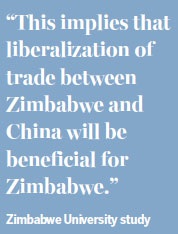FTA with China could boost Zimbabwe trade, study says

Removal of tariffs could result in gain of $9.5m for country, says report, rejecting negative hypothesis
Zimbabwe could gain about $44 million worth of new trade and a positive net trade effect of $9.5 million from the removal of import tariffs if it adopts a free trade area with China, a study by the University of Zimbabwe says.
A free trade area is an agreement between two or more trading partners to facilitate trade through the removal of all tariff and nontariff barriers.
| A study by the University of Zimbabwe says that Zimbabwe will benefit greatly if it adopts a free trade area with China. Provided to China Daily |
"Empirical results show that close to $44.39 million worth of new trade will be created with China, while around $34.9 million of trade will be diverted resulting in a positive net trade effect of $9.49 million for Zimbabwe.
"This implies that liberalization of trade between Zimbabwe and China will be beneficial for Zimbabwe," the study, published to coincide with the 10th anniversary of the Confucius Institute at the University of Zimbabwe on Oct 12, concluded.
Conducted by two senior lecturers in the Department of Economics at UZ, Fanuel Hazvina and Albert Makochekanwa, the study sought to investigate the potential impacts of the formation and implementation of a Zimbabwe-China FTA.
Conversely, the study said that Zimbabwe could lose around $44.78 million in tariff revenue if duties were only removed from its imports from China.
It (research) noted, though, that a reciprocal tariff reduction of 100 percent by both China and Zimbabwe could lead to a rise in Zimbabwe's exports, particularly sanitary ware, tampons, nappies and nappy liners for babies, tobacco and some manufactured products.
"Overall, an FTA between Zimbabwe and China will result in positive trade effect of $9.5 million. Thus, the results from the study lead us to reject the hypothesis that an FTA between Zimbabwe and China will negatively affect Zimbabwe's economy," the study said.
The researchers said that if Zimbabwe is committed to full trade liberalization with China, it must introduce new fiscal revenue lines to compensate for the loss in tariff revenue.
This can be achieved through focusing on nontrade tax revenue sources and instituting efficient fiscal revenue collection methods.
To address potential employment losses that could result from the displacement of local production by imports from China, the study said the government could devise skills and productivity adjustment programs that facilitate the relocation of labor into sectors where production will be expanding because of the FTA.
To conduct the study, the researchers used a model based on the system of market analysis and restrictions of trade model of the World Integrated Trade Solution data retrieval system.
Zimbabwe currently grants tariff preferences under bilateral, regional and multilateral trade agreements, but it has no special trade policy with China.

China offers unilateral preferential treatment to less-developed countries and, since 2013, it has lowered duties to zero on 95 percent of tariff lines for imports from such countries.
Zimbabwe does not benefit from the Chinese preference plan for Africa.
In recent years, bilateral trade between China and Zimbabwe has witnessed rapid growth, which has seen China become Zimbabwe's key trade partner.
Chun Feng, economic and commercial counsellor with the Chinese embassy in Zimbabwe, says annual bilateral trade between the two countries rose from $560 million in 2010 to $1.3 billion in 2015. The target by 2020 is $2 billion.
China and Zimbabwe trade mainly in manufactured goods. Zimbabwe's exports to China consist largely of raw materials such as tobacco, nickel, ferro chrome and cotton.
The main products imported from China to Zimbabwe are mechanical and electrical products, textiles and high-tech products.
For China Daily
(China Daily Africa Weekly 11/24/2017 page28)
Today's Top News
- China's annual express delivery volume tops 170 billion
- Recruiters seek overseas graduates
- 2025 a crucial year to reflect on history
- Beijing, Washington agree to manage differences
- RMB expected to stay resilient, rebound despite headwinds
- 'Ice City' warms up for winter Games































